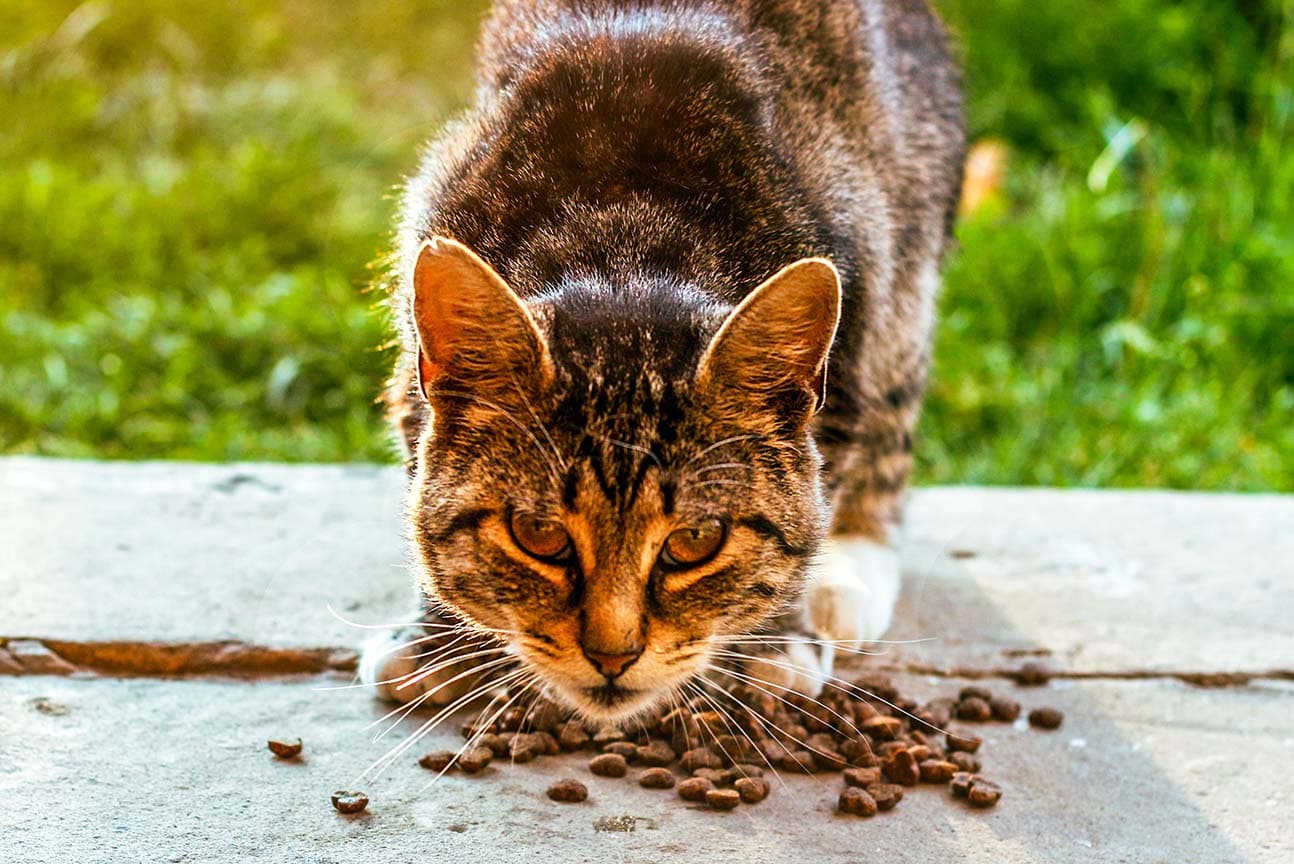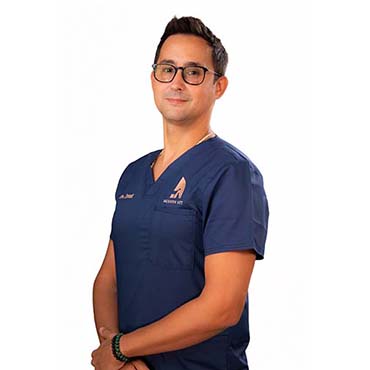Reviewed by Dr. Ionut Rusu
Updated on 26/09/2025
Reading time 4 min.
Overview
Severity: Low
Life stage: All
When your feline companion suddenly shows little interest in their favourite meals, it’s natural to feel concerned. Poor appetite in cats may signal underlying health issues that require prompt attention. Unlike dogs or humans, cats can develop serious complications within 48 hours if they’re not eating anything, particularly a condition called hepatic lipidosis, where the liver struggles to process fat stores. In Dubai, where heat, indoor lifestyles, and feeding habits can influence feline health, it’s important to understand what’s normal, what’s not, and when to act.
What to do if your cat is not eating
- Try to remain calm and observe your cat’s overall behaviour. Check if they’re showing interest in food but are unable to eat, or if they’re completely avoiding their food bowl.
- Ensure their food and water bowls are clean. Cats can be very sensitive to the smell and taste of old food or dirty bowls. In the heat of Dubai, food can spoil fast, so be vigilant about this. Place their bowls away from their litter tray in a quiet, calm area.
- Are there other signs, like lethargy, vomiting, weight loss, hiding, or drooling?
- Is it possible they are eating from other bowls or outdoor scraps?
- Warm up their usual wet food slightly. This enhances aroma and taste.
- Try a different flavour or texture of food to tempt their taste buds.
- Mix in a little tuna water or a small amount of cooked, plain chicken or fish.
Common causes of poor appetite in cats
- Cats often experience reduced appetite and decreased activity during hot weather due to heat stress.
- In Dubai’s intense summer heat, many cats naturally eat less as their energy requirements decrease.
- Dental disease, like tooth pain or gingivitis.
- Many illnesses, like kidney disease, liver disease, pancreatitis, gastroenteritis, and constipation.
- Stress and anxiety.
- Sometimes, a cat can associate their food with a negative experience, like feeling sick after eating. This is called food aversion and can lead to them refusing that specific food.
- Fever or infections.
- Dehydration suppresses appetite and makes cats feel unwell.
When to Worry
Contact an emergency veterinary clinic immediately if your cat shows:
- Yellow tinge to the gums, eyes, or skin (jaundice)
- Difficulty breathing or rapid breathing
- Signs of dehydration (sunken eyes, dry gums, skin tenting)
Seek veterinary advice as soon as possible if your cat shows:
- Complete loss of appetite for more than 48 hours (8-12 hours in kittens)
- Vomiting alongside appetite loss
- Lethargy or hiding behaviour
- Appetite gradually decreasing over several days
- Drinking significantly more or less water than usual
- Changes in urination or bowel movements
- Signs of pain or discomfort
- Weight loss
Keeping your cat’s appetite healthy in Dubai
- Ensure your home has adequate air conditioning and provide cool, shaded areas for your cat to rest. Consider cooling mats designed for pets during the hottest months.
- Store dry food in airtight containers in cool areas. Refrigerate wet food promptly and don’t leave it out for more than 30 minutes in Dubai’s heat.
- Annual health checks can identify dental disease, kidney problems, and other conditions before they severely impact appetite. Senior cats (over 7 years) benefit from twice-yearly examinations.
- Ensure your cat has a safe, quiet space to eat, away from other pets or household disturbances.
- Feed high-quality food appropriate to age and lifestyle. Avoid sudden changes to your cat’s food. If you need to switch brands, do so gradually over several days.
- In Dubai’s heat, ensuring your cat drinks enough water is vital. Consider using a water fountain, as many cats prefer to drink from running water.
- Up-to-date vaccinations and regular worming reduce infection risk.
- Maintain consistent routines, provide hiding spots, and introduce changes gradually. Use pheromone diffusers if your cat is particularly sensitive to environmental changes.
What to monitor when your cat isn’t eating well
Normal eating behaviour varies between cats, but most healthy cats eat small meals throughout the day. You should be concerned if you notice:
- Approaching food but then walking away without eating
- Only eating treats but refusing regular food
- Taking significantly longer to finish meals
- Preferring to eat only wet food or only dry food when they previously enjoyed both
- Eating on one side of their mouth (suggesting dental pain)
- Drooling while attempting to eat
- Being quieter than normal or withdrawn
- Overgrooming
Safe ways to encourage eating
- Slightly warming wet food to body temperature can make it more appealing and aromatic. Never microwave – use warm water to heat the container gently.
- Offer different proteins and textures. Fish flavours are often more appealing to reluctant eaters.
- Add warm water or low-sodium chicken broth to dry food to increase moisture content and palatability. This will also help them stay hydrated.
- Offer smaller portions more frequently rather than large meals, especially during hot weather.
- Create a quiet, comfortable feeding area away from their litter tray, other pets and household noise.
Force-feeding a cat to eat is not very effective and often causes more harm than good. If your cat’s appetite isn’t improving after 24 hours, seek further advice from your vet.
Veterinary care for appetite loss
Your veterinarian will perform a thorough physical examination to try and pinpoint the cause of the problem. This will involve checking their mouth for any dental issues, palpating their abdomen, and taking their temperature. Depending on the initial findings, the vet may recommend further diagnostic tests, such as:
- Blood tests to check organ function (kidney, liver), screen for infections, and check for conditions like diabetes or hyperthyroidism.
- Urine tests to assess kidney function and rule out urinary tract infections.
- X-rays or ultrasound to look for foreign bodies, tumours, or other abnormalities in the digestive tract or other organs.
- PCR testing for some infectious diseases.
Based on the diagnosis, your vet will create a tailored treatment plan. This may include:
- Fluid therapy to correct dehydration
- Anti-nausea medication
- Pain relief
- Appetite stimulants
- Medication to treat the underlying illness
- If your cat is severely dehydrated or has a serious underlying condition, they may need to be hospitalised for intensive care and supportive feeding with a feeding tube.
Cats at higher risk of poor appetite in Dubai
- Senior cats (over 7 years) are more prone to conditions that affect appetite like dental disease or arthritis.
- Cats with chronic conditions like diabetes, kidney disease, or heart disease.
- Recently relocated cats, as the stress of moving and adapting to a different climate can significantly impact appetite.
- Long-haired breeds may struggle more with heat-related appetite changes or suffer with hairballs.
- Overweight cats are more susceptible to the serious complication of hepatic lipidosis if they stop eating suddenly.
Concerned about your cat’s appetite?
If your cat is refusing food or showing signs of illness, don’t wait. Book a check-up or emergency appointment today at Modern Vet Hospital in Dubai. Their experienced team offers diagnostic services, emergency care, and ongoing support tailored to your cat’s needs. Whether it’s a routine concern or something more urgent, Modern Vet Hospital is your trusted veterinary clinic in Dubai for compassionate, professional care.
Share this, choose your platform!
Reviewed by
Dr. Ionut Rusu
USAMV, RCVS
Dr. Ionut Rusu is a senior veterinarian with nearly a decade of successful experience in the field. He graduated in 2014 from the University of Agricultural Sciences and Veterinary Medicine (USAMV)…


